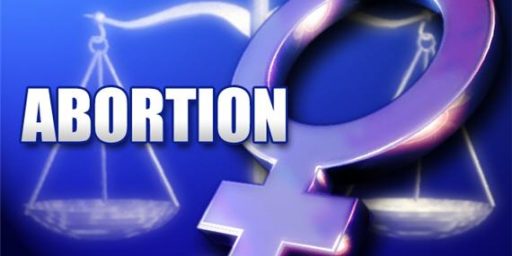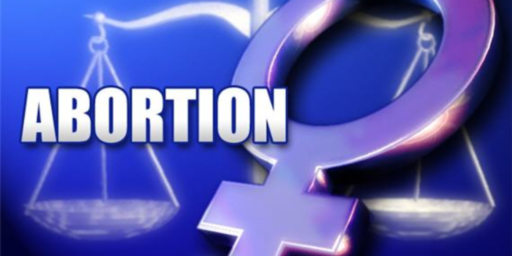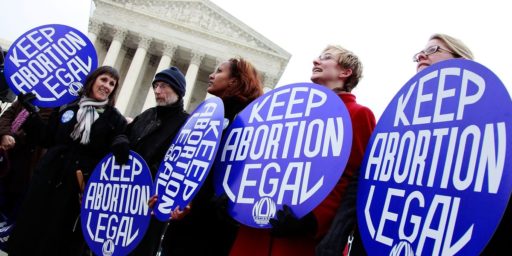Presidents and Abortion Rights
George Will argues, correctly, I think, that the next presidential election will have little practical effect on abortion policy. First, the Supreme Court is unlikely to substantially reverse Roe v. Wade, for a variety of reasons. Second, in the unlikely event it did, it wouldn’t much matter because only a small handful of states — none of them Electoral College swing states– might conceivably outlaw abortion.
Steve Benen cites Dana Goldstein in rebuttal.
First, is it inconceivable that while women in California and New York understand their own states are likely to protect existing abortion rights, they also believe strongly that other women, in Mississippi and South Dakota and Nebraska, deserve the same freedom? Secondly, Will’s argument proceeds from the spurious assumption that in “liberal” states, access to abortion is already universal and protected by the law. In fact, low-income women who rely upon Medicaid for health care are barred by the federal government from using their benefits to access abortion. So the reproductive health priorities of the next president are crucially important not only to protecting choice in individual states, but to expanding it nationwide.
This is a classic case of the two sides talking past one another. Both are right, simply emphasizing a different set of priorities and unable to understand the other’s.
Absent the election of a social conservative to the White House (and the odds are long at the moment that either party will nominate one) and the election of 60 social conservatives to the Senate (the likelihood of which approximates zero), the basic principles of Roe will still be intact at the end of the next presidential term. Further, if that perfect storm were to occur, the actual policy results will be nil outside perhaps Alabama, Mississippi, and Utah. (I don’t think Nebraska or South Dakota would be likely to join them, but I could be mistaken.)
Clearly, though, for True Believers in A Woman’s Right to Choose, that’s not enough. They need an existential commitment that A Woman’s Right to Choose will continue to be artificially enshrined in the Constitution, where it has mysteriously resided since 1973 (it’s address for the nearly two centuries before remains unknown). That one woman in Pascagoula might theoretically be deprived of a hypothetical abortion is simply too much to bear.
Goldstein also points to a more practical distinction:
Let’s also not forget that the president makes appointments that affect women’s sexual health, to the Office of Family Planning, the FDA, and the like. George W. Bush needlessly politicized debates over the morning-after pill and sex-ed by appointing officials who were willing to join him in ignoring near-univeral recommendations from the medical and educational communities. As a result, Plan B was kept behind the counter for years longer than necessary, and our federal government wastes hundreds of millions of dollars on abstinence-only education. A candidate’s ideology on abortion is an excellent predictor of his or her ideology on these closely related matters.
That’s right, of course. The president has relatively little power in setting policy on abortion and related issues, since he must operate within the framework of legislation and judicial rulings. Still, there’s significant ability to influence enforcement and the level of aggressiveness via the regulatory process. A President Gore would have almost certainly been more amenable to making OTC access to “morning after” pills available; what that would have meant, practically, is an open question.
Still, Will’s larger point remains intact. While “So what?” is too glib, the degree to which the next election will influence abortion policy is negligible, at best. We’ll almost certainly, therefore, spend far, far too much time emphasizing the issue relative to the degree of change at stake. To the extent that a candidate’s stance on abortion is a proxy for other policies, that’s perhaps not as colossal a waste of time as it might otherwise be. Even so, it’s just another way in which emotionalism and manufactured outrage, rather than a calm discussion of issues, has come to dominate our politics.




I don’t think this is a case of talking past each other, though perhaps I’m not understanding how the term is used. I think it’s a case of increased polarization.
“”This is a classic case of the two sides talking past one another. Both are right, simply emphasizing a different set of priorities and unable to understand the other’s.””
“”””””””””””””””””””””””””””””””””””””””””””””””””””””””””””””””””””””””””””””””””””””””””””””””””””
This statement is surely a half truth, George Will nearly always understands both sides before taking a position! His position in this case, as usual is correct.
Off subject note to Dana; Half the population sees abortion as murder. To them it is enough to tolerate it,and too much to be forced at gunpoint to pay for it.
The point about the Presidential power of appointment in family planning areas, medical areas, and other matters impacting the rights of women in general, and in reproductive matter is, of course, correct, but probably much stronger than the article suggests.
Bush has placed a woman named Orr at the head of Family Planning in the last few days – she is a dedicated anti-free choice person, with a long public record of dedication to the dogma of the “social conservatives” in her political and career associations.
The White House has been consistent for almost seven years in placing people in appointments who can challenge women’s rights, and they have done it here, and in a broader sense, in our international responsibilities about families and women.
John Isaacson
Director
http://www.Presidential-Appointments.org
The rules of government certainly limit this as an issue in the upcoming presidential election. The question that came up for me is the importance of abortion as an issue to voters.
So I checked on the Rasmussen Reports to see where the issue was with voters. It is “very important” at number 10 with “38%” of those polled. My expectation is that those who considered abortion as a very important issue includes people on both sides of the issue. Then when it comes time to cast their vote, some of them will let other issues over-ride this one in their choice of candidate. That moves it even further down in influence, unless it affects swing states.
Dana Goldstein hit the mark when she said that George Will was “explaining to pro-choice Californians why they should vote for Rudy Giuliani.”